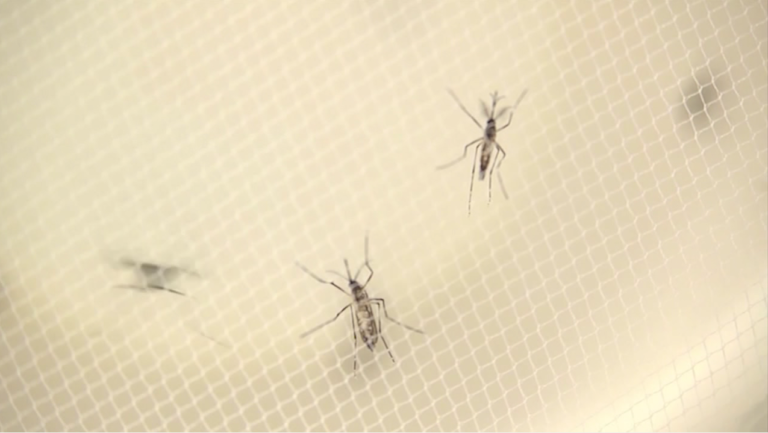Delaware health officials continue to remind residents to shield themselves from Zika

The Delaware Division of Public Health (DPH) is continuing to remind residents to shield themselves from the Zika virus with support from a statewide advertising campaign launched last May.
The campaign encourages travelers, particularly pregnant women, to take steps to prevent Zika.
Zika has reportedly been found in multiple popular travel locations. Officials say that Delaware's 17 confirmed Zika cases all resulted from mosquito bites while traveling abroad, but there are warmer climates in the continental U.S with local Zika transmission.
Officials say that anyone planning a trip over the summer should educate themselves on the virus's dangers and how to prevent the disease before setting off for your destination.
DPH Director Karyl Rattay says, "Through this campaign, we are striving to remind women who are pregnant or trying to become pregnant, that Zika is still a serious disease that should not be taken lightly. Pregnant women and their partners should avoid travel to areas where Zika is found and everyone should protect themselves from mosquito bites."
Dr. Rattay is also reminding everyone to use EPA-registered insect repellent, wear long sleeves and pants, and use barrier methods including condoms or dental dams when having intercourse with someone who could be infected with Zika.
Officials say that the Zika outreach campaign includes radio, billboard, transit, digital and pre-show movie theater advertising. DPH is also using strategies to reach Hispanic women who could be more likely to go to areas impacted by the Zika virus.
Officials say that Zika is a disease caused by a virus primarily transmitted through the bite of infected Aedes mosquitoes and can also be passed via sexual transmission. Some symptoms of Zika are rash, fever, joint pain, and conjunctivitis (red eyes). Some people who become infected with Zika do not experience any symptoms.
The largest health impact of the Zika virus reportedly seems to be on infants whose mothers were infected during pregnancy. Officials say that there have been reports of a serious birth defect of the brain called microcephaly. Microcephaly is a condition in which a baby's head is smaller than expected when compared to babies of the same gender and age, along with other poor pregnancy outcomes in babies of mothers who were infected with Zika virus while pregnant.
DPH and the Centers for Disease Control and Prevention (CDC) officials say that they have many resources to inform people on the effects of Zika, such as the CDC's text messaging service that will tell travelers about Zika updates for their destinations. To get text messages about Zika for your destination, you can text PLAN to 855-255-5606 to subscribe.
DPH Medical Director Dr. Awele Maduka-Ezeh says, "Currently, there is no known treatment for, and no vaccine against, Zika. Prevention is the only protection. Everyone should take proper precautions when traveling to areas where Zika is spreading, as they can get infected with the virus via mosquito bites or sex while away and spread it through sexual transmission themselves both when traveling and when they return home."
Officials say that mosquito bite avoidance strategies include:
- Wear long-sleeved shirts and long pants. When possible, stay where there is air conditioning or stay in places that use window and door screens to keep mosquitoes outside.
- Use Environmental Protection Agency (EPA)-registered insect repellents.
- Follow the manufacturer's instructions for reapplication times.
- Sleep under a mosquito bed net if you are out of the country or outside.
- Keep in mind that the mosquitos that spread Zika reportedly bite actively during the day and the night.
If you have a baby or child:
- Do not use insect repellent on babies younger than two months of age.
- Dress your child in clothing that covers arms and legs, or cover the crib, stroller, and baby carrier with mosquito netting.
- Do not apply insect repellent onto a child's hands, eyes, mouth, or on cut or irritated skin.
- Adults: Spray insect repellent onto your hands and then apply to the child's face.
Clothing:
- Treat clothing and gear with permethrin or purchase permethrin-treated items. Treated clothing remains protective after multiple washings. See product information to learn how long the protection will last. If treating items yourself, follow the product instructions carefully.
- Do NOT apply permethrin products directly on skin. They are intended to treat clothing.
- Women who have had possible exposure to Zika through travel or sexual contact, regardless of whether or not they exhibited symptoms or are trying to conceive, should wait at least eight weeks before having unprotected sex.
- Men who may have been exposed to the virus should wait at least six months before having unprotected sex, regardless of whether or not they are exhibiting symptoms or are planning to conceive. Preventing Zika transmission to a woman who may, or is planning to, conceive in the next few months is particularly important, given Zika's link to serious and even fatal birth defects.
Women who are pregnant or planning to become pregnant can find more information on Zika here.
DPH recommends the following resources for the latest on Zika and microcephaly:
• As new Zika findings become available, DPH will update its Zika page to inform Delawareans here.
• Use the CDC's new text messaging service to receive Zika updates for your destination. Text PLAN at 855-255-5606 to subscribe.
• Visit the CDC's Zika website for updates and newly infected areas.
• Visit the CDC's website on microcephaly here.


